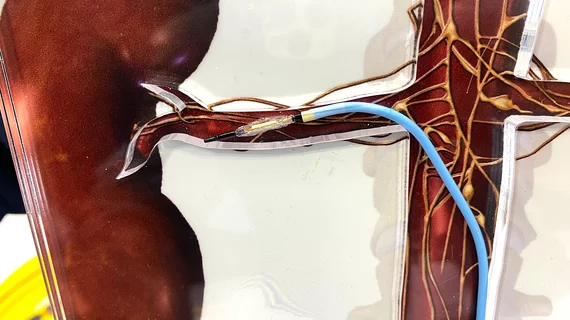Renal denervation systems from Recor Medical, Medtronic receive new outpatient payments
Renal denervation (RDN) systems from Recor Medical and Medtronic have received transitional pass-through (TPT) payments from the Centers for Medicare and Medicaid Services (CMS) in the 2025 Medicare Hospital Outpatient Prospective Payment System.
Recor Medical's Paradise Ultrasound RDN system gained U.S. Food and Drug Administration (FDA) approval for treating uncontrolled hypertension back in November 2023. It was the first RDN system for hypertension to ever gain FDA approval. Medtronic’s Symplicity Spyral RDN system became the second just weeks later.
These TPT payments, designed to help support the use of newer technologies, go into effect Jan. 1, 2025. They can last up to three years.
CMS created a new device category and code—C1736: Catheter Renal Denervation, Ultrasound—specifically with the Recor Medical offering in mind.
“TPT for ultrasound renal denervation increases access to a proven device-based hypertension treatment option to patients who have been unable to achieve blood pressure control with lifestyle changes and medications alone,” Lara Barghout, president and CEO of Recor Medical, said in a statement. “The granting of TPT highlights the safety and efficacy of this breakthrough device, which together demonstrated that the Paradise Ultrasound RDN system met the newness and significant clinical improvement criteria. By creating a distinct device category, CMS have also recognized that the Paradise Ultrasound RDN system is a highly differentiated technology and that there are significant differences in comparison to other technologies available in the marketplace.”
Medtronic’s Symplicity Spyral RDN system uses radiofrequency energy instead of ultrasound to calm excessive nerve activity associated with the kidneys. The company shared its own statement celebrating the policy update from CMS.
“Receiving TPT approval for our RDN catheter is an important milestone for the Symplicity blood pressure procedure, as it will enable greater patient access to a breakthrough treatment by reducing cost barriers for healthcare systems,” said Jason Weidman, senior vice president and president of Medtronic’s coronary and RDN business. “Very few technologies achieve this qualification, and the core goals of fostering innovation and increasing access mirror Medtronic's desire to continue bringing Symplicity to even more patients suffering from uncontrolled high blood pressure. We look forward to continuing to work with CMS to establish coverage and expand patient access.”
Both system received inpatient payments from CMS back in August.

